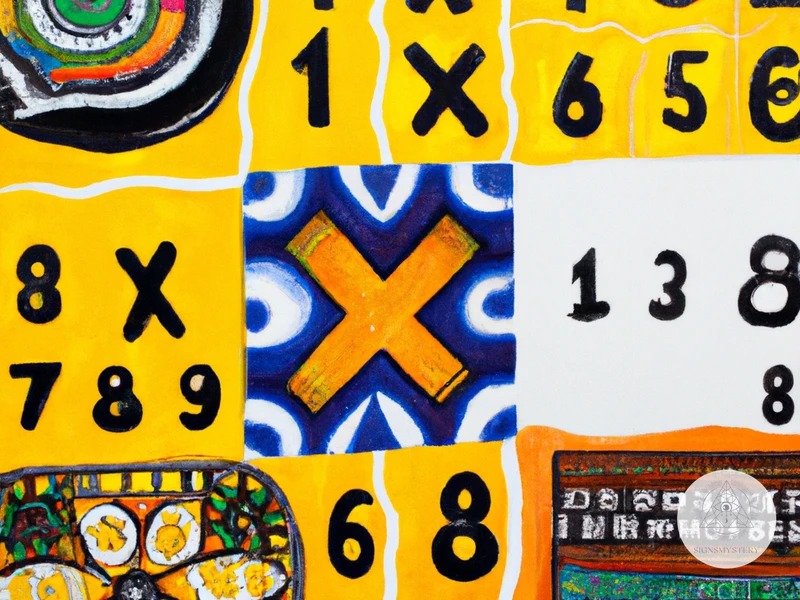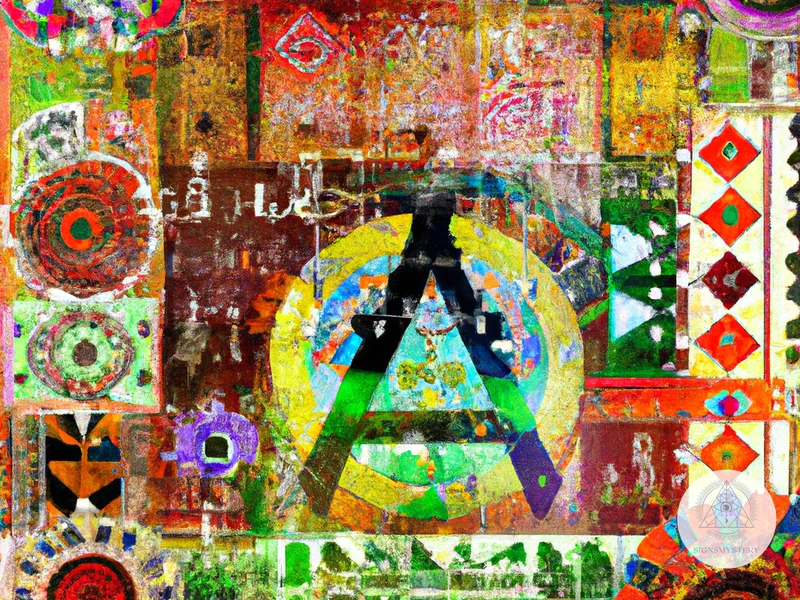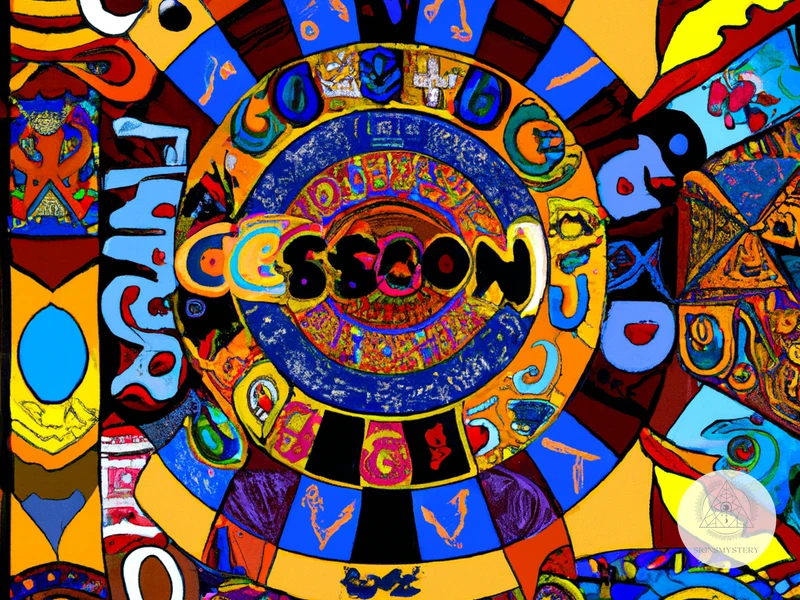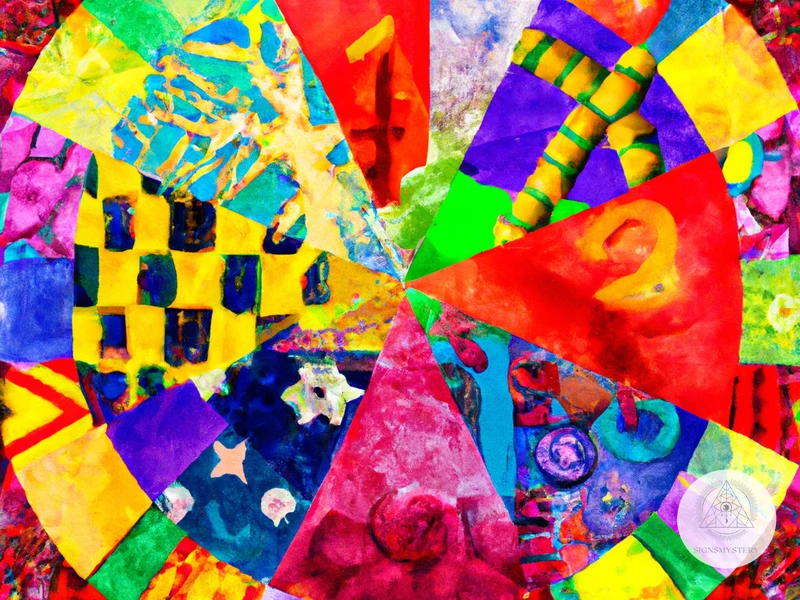African cultural beliefs and practices are rich and diverse, often rooted in ancient traditions and deeply intertwined with spiritual and mystical elements. One such aspect is the profound impact of numerology on African culture. Numbers hold significant symbolism and play a vital role in various aspects of African society, including divination, naming practices, rituals, and ceremonies. From birth and naming ceremonies to marriage rituals and funeral traditions, numerology is a thread that weaves through different regions and communities across the continent. In this article, we explore the fascinating world of numerology in African cultural beliefs, examining its significance, regional variations, and adaptation in modern times.
The Significance of Numbers in African Culture

In African culture, numbers hold deep significance and are imbued with symbolic meaning. Each number is believed to possess certain qualities and characteristics that influence various aspects of life. Let’s explore the significance of numbers in African culture:
1. Number 1: This number represents unity, independence, and new beginnings. It symbolizes the individual’s ability to manifest their desires and achieve success. In African societies, number 1 is often associated with leadership and the initiation of important projects or ventures.
2. Number 2: Number 2 embodies duality, balance, and harmony. It represents the interconnectedness of people and the importance of partnerships and relationships. In African culture, this number is often associated with marriage, as it signifies the joining together of two individuals to create a unified whole.
3. Number 3: Number 3 is associated with creativity, self-expression, and communication. It is believed to have a powerful influence on artistic pursuits, as well as the ability to express oneself with clarity and eloquence. In African cultures, this number is often linked to storytelling, music, and dance.
4. Number 4: Number 4 symbolizes stability, foundation, and practicality. It represents the solid structures and systems that support society. In African culture, this number is associated with traditions, customs, and ancestral wisdom.
5. Number 5: Number 5 embodies adventure, freedom, and change. It represents the exploration of new horizons and the embracing of transformative experiences. In African societies, number 5 is often linked to travel, exploration, and the pursuit of personal growth.
6. Number 6: Number 6 represents balance, harmony, and nurturing. It is associated with family, community, and the responsibilities of caregiving. In African culture, this number is often connected to the role of parents, as well as the collective well-being of the community.
7. Number 7: Number 7 is considered a sacred number in many African cultures. It symbolizes spiritual growth, knowledge, and intuition. It is often associated with divination practices and the search for deeper meaning and understanding.
8. Number 8: Number 8 embodies abundance, prosperity, and success. It represents the rewards of hard work and the ability to manifest wealth and abundance. In African culture, this number is often associated with entrepreneurship and financial prosperity.
9. Number 9: Number 9 symbolizes completion, culmination, and transition. It represents the end of a cycle and the beginning of a new phase in life. In African cultures, this number is often linked to rites of passage and the journey towards spiritual enlightenment.
The significance of numbers in African culture extends beyond mere superstition; it is deeply rooted in the belief that numbers carry inherent qualities and energies that shape and influence various aspects of life. By understanding the symbolism of numbers, Africans are able to tap into their unique meanings and harness their power for personal and collective growth.
The Symbolism of Numbers
In African culture, numbers are not just seen as mere quantities; they possess deep symbolism that shapes various aspects of life. Here, we explore the rich symbolism of numbers in African culture:
1. Unity: The number 1 symbolizes unity and represents the idea of oneness. It signifies the interconnectedness of all beings and the harmonious coexistence within a community or society. In African culture, this symbolism is often reflected in the concept of Ubuntu, which emphasizes the importance of collective well-being.
2. Balance: Number 2 embodies the idea of balance and duality. It represents the complementary forces in the universe, such as light and dark, yin and yang, and masculine and feminine energies. This symbolism is often reflected in African art and ritual practices, where balance and harmony are sought after.
3. Creativity: Number 3 is associated with creativity and self-expression. It represents the power of manifestation and the ability to bring ideas and visions into reality. In African cultures, this symbolism is reflected in various art forms, such as storytelling, music, dance, and visual arts, which are considered integral to cultural preservation.
4. Stability: Number 4 signifies stability and represents the foundation upon which communities and societies are built. It symbolizes the importance of structure, tradition, and ancestral wisdom. African cultures often place great emphasis on maintaining strong family and community ties, which provide a sense of stability and support.
5. Transformation: Number 5 embodies the concept of transformation and change. It represents the ability to adapt and evolve in response to life’s challenges and opportunities. In African cultures, this symbolism is often seen in initiation rituals and rites of passage, where individuals undergo significant transformations to assume new roles and responsibilities.
6. Community: Number 6 symbolizes community and nurturing. It represents the importance of interdependence and the collective responsibility to care for one another. African cultures often prioritize communal values and emphasize the well-being of the entire community over individual interests.
7. Spirituality: Number 7 holds great significance in African culture, representing spirituality and intuition. It symbolizes the connection between the physical and spiritual realms and the pursuit of higher knowledge. Divination practices and spiritual rituals often incorporate the symbolism of number 7.
8. Abundance: Number 8 symbolizes abundance and prosperity. It represents the rewards of hard work, discipline, and resilience. In African cultures, this symbolism is often reflected in agricultural practices, where a bountiful harvest is seen as a sign of prosperity and abundance.
9. Cycles: Number 9 represents cycles and transitions. It symbolizes the completion of a phase and the beginning of a new one. In African cultures, this symbolism is often seen in rituals and ceremonies that mark major life events, such as birth, initiation, marriage, and death.
The symbolism of numbers in African culture is deeply ingrained in everyday life and belief systems. It shapes the rituals, traditions, and perspectives of African communities, fostering a sense of interconnectedness, balance, and spiritual growth. Understanding the symbolism of numbers provides profound insights into the cultural fabric of African societies.
The Role of Numerology in Divination
In African culture, divination plays a significant role in seeking guidance and insight into various aspects of life. Numerology is often incorporated into divination practices, enhancing the interpretation of messages received. Here’s a deeper look into the role of numerology in divination:
1. Numerological Systems: Different African regions have their own unique numerological systems for divination. These systems assign specific meanings and interpretations to numbers based on their cultural beliefs and practices. Numerologists, known as diviners or spiritual practitioners, have a deep understanding of these systems and utilize them to decipher messages from the spirit realm.
2. Number Combinations: Numerology in divination involves analyzing number combinations that are derived from various sources like birth dates, names, or significant events. These number combinations are interpreted to gain insights into personal traits, life paths, relationships, and future outcomes. For example, a diviner may use the birth date of an individual to determine their life purpose and the challenges they may encounter.
3. Symbolic Meanings: Numerology assigns symbolic meanings to each number, which diviners use to interpret their significance in divination. For instance, the number 7 is commonly associated with spirituality and introspection, while the number 9 is often linked to transformation and completion. The diviner combines these symbolic meanings with their knowledge of the individual’s circumstances to provide guidance and advice.
4. Divination Methods: Numerology is employed within diverse divination methods, depending on the cultural practices of a particular African community. This may include methods such as casting of bones, throwing of cowrie shells, or interpreting patterns formed by objects. These divination tools incorporate numbers alongside other symbolic elements to provide a holistic understanding of the situation at hand.
5. Personal and Spiritual Growth: Numerology in divination not only helps in gaining insight into specific situations but also promotes personal and spiritual growth. By understanding their numerological profile, individuals can identify their strengths, weaknesses, and life lessons. This knowledge can guide them in making informed decisions and fostering personal development.
6. Link to Ancestral Wisdom: Numerology in divination connects individuals with their ancestry and the wisdom of their ancestors. In African culture, it is believed that the spirits of the ancestors guide and influence the living. Numerological interpretations provide a medium through which the messages of the ancestors can be conveyed, ensuring a connection to the past and the preservation of cultural beliefs.
Understanding the role of numerology in divination allows us to appreciate the depth and intricacy of African spiritual practices. By incorporating numerology into divination, individuals seek guidance, clarity, and a deeper understanding of their lives and the forces at play. Through this practice, African cultures continue to uphold the ancient traditions that have shaped their beliefs and fostered a connection to the spiritual realm.
Numerology and Naming Practices
Numerology plays a significant role in African naming practices, where names are carefully chosen to reflect the qualities and characteristics desired for the individual. Here are some key aspects of numerology in African naming practices:
1. Assigning Numerical Values: In many African cultures, each letter of the alphabet is assigned a specific numerical value. These values are then used to calculate the numerical total of a person’s name. The resulting number is believed to hold significant meaning and influence over the individual’s personality and destiny.
2. Meanings Behind Numbers: Different numbers are associated with specific qualities and traits in numerology. African parents often consult with spiritual leaders or numerologists to determine the desired qualities they wish to imbue in their child’s name. For example, a name with a high numerical value might signify leadership or intelligence, while a name with a lower value might symbolize humility or gentleness.
3. Choosing Name Components: African parents often select names based on the numerical value of individual components within the name, such as syllables or individual letters. They may combine specific letters or syllables with the desired numerical meaning to create a balanced and harmonious name.
4. Ancestral Connections: In some African cultures, naming practices are deeply rooted in ancestral connections and lineage. Names may be chosen to honor and carry forward the traits and qualities of beloved ancestors. Numerology is used to ensure that the chosen name aligns with the numerological significance of the ancestors’ names.
5. Compatibility and Harmonization: Numerology also plays a role in ensuring compatibility among family members. Parents may consult with numerologists to determine compatibility between siblings’ names or between the parents’ names and their children’s names. The goal is to create a harmonious balance within the family unit.
6. Modifying Names: In some cases, individuals may choose to modify or alter their names based on numerological guidance. This could involve adding or removing letters to create a more harmonious and balanced name that aligns with the desired numerological qualities.
The practice of incorporating numerology into naming practices reflects the belief in the power of numbers and their ability to influence an individual’s life path. By choosing names based on numerological principles, African communities seek to empower individuals with qualities and traits that are believed to bring success, happiness, and fulfillment.
Note: To learn more about the influence of numerology on personal characteristics, you may be interested in exploring the concept of the hidden talents expression number. However, this concept is not specifically related to African naming practices.
Numerology in Rituals and Ceremonies
Numerology plays an integral role in various rituals and ceremonies across African cultures, infusing them with deeper meaning and spiritual significance. Let’s explore how numerology is incorporated into different African rituals and ceremonies:
1. Birth and Naming Ceremonies: When a child is born, numerology is often consulted to determine the auspiciousness of the birthdate and to choose a name that aligns with the child’s destiny. Each letter in the name is assigned a numerical value, and these values are analyzed to gain insights into the child’s personality traits, potential talents, and life purpose. Through numerology, parents seek to give their child a name that will positively influence their future.
2. Marriage and Relationship Rituals: Numerological compatibility is a crucial consideration in African marriage traditions. Couples consult numerology to determine the compatibility of their life paths and to ensure a harmonious union. By analyzing the birthdates and names of the individuals involved, numerology provides insights into their compatibility, highlighting areas of strengths and challenges. This enables couples to make informed decisions and to navigate their relationship with a deeper understanding.
3. Funeral and Ancestral Traditions: In African cultures, numerology is also intertwined with rituals surrounding death and ancestral worship. The timing of the funeral, burial rituals, and ancestor remembrance ceremonies often involves numerical considerations. Certain numbers hold specific significance, such as the number 7 representing a journey from the physical realm to the spiritual realm. Numerology helps guide the rituals and ceremonies associated with honoring and communicating with ancestors.
Numerology enriches these rituals and ceremonies by providing a framework for understanding the energetic connections between individuals, events, and the spiritual realm. It offers guidance in making important decisions and fosters a deeper connection with one’s ancestral lineage. By incorporating numerological principles into these sacred practices, Africans believe they can align themselves with the divine forces that govern the universe and create a greater sense of harmony and purpose.
Numerology can also provide insights into maintaining optimal physical and mental health by uncovering potential imbalances in a person’s life path and suggesting remedies or lifestyle adjustments. These insights can be used to promote well-being and overall vitality.
Birth and Naming Ceremonies
In African culture, birth and naming ceremonies hold great significance as they mark the entrance of a new life into the community. These ceremonies are filled with rituals and traditions that incorporate numerological beliefs. Here are some key aspects of birth and naming ceremonies in African culture:
1. Ritual Cleansing: Prior to the birth and naming ceremony, the child and mother may undergo a ritual cleansing process. This is done to purify their spirits and ensure their well-being. The number of cleansing rituals performed may vary depending on the specific cultural practices.
2. Numerological Divination: Numerology plays a crucial role in determining the child’s name and its associated significance. A divination process may take place, involving the use of numerological calculations to determine the most auspicious name for the child. Numerologists believe that each name carries a specific vibration and energy that can influence a person’s life path.
3. Naming Ceremony: The naming ceremony is a joyous occasion where friends, family, and community members gather to celebrate the arrival of the newborn. The child’s name is announced, and prayers and blessings are offered for their well-being and future success. Numerological considerations are taken into account when selecting a name that aligns with the child’s destiny and life path.
4. Numerological Significance: The chosen name may reflect the family’s ancestral heritage, have cultural significance, or be derived from nature or virtues. The numerological significance of the name is also carefully considered. Certain numbers may be deemed more favorable or auspicious based on the cultural beliefs of the community.
5. Symbolism in Gifts: During the birth and naming ceremony, the child is often showered with gifts that hold symbolic meaning. These gifts may include items that align with the child’s numerological profile or represent blessings for their future success and well-being.
6. Community Involvement: Birth and naming ceremonies in African culture are community-centered events. The entire community comes together to celebrate the new addition and offer their support and blessings. It is a time for sharing knowledge, wisdom, and passing down cultural traditions from one generation to the next.
Birth and naming ceremonies in African culture not only celebrate the birth of a child but also embrace the beliefs and practices surrounding numerology. These ceremonies serve as a way to honor the child’s unique numerological profile, ensuring that they start their life journey on a path believed to bring them prosperity, success, and fulfillment.
Marriage and Relationship Rituals
Marriage and relationship rituals in African culture are deeply influenced by numerology and the belief in the power of numbers. These rituals are often elaborate and filled with symbolic gestures that serve to strengthen the bond between couples. Here are some examples:
1. Bride Price: In many African societies, the concept of bride price is prevalent. The bride’s family requests a specific number of items or resources from the groom or his family as a symbolic representation of the groom’s commitment and worthiness. The number of items or resources is often chosen carefully, with each item representing a specific aspect of the union, such as fertility, prosperity, or harmony.
2. Naming Ceremony: In some African cultures, couples undergo a naming ceremony at the beginning of their relationship. The purpose of this ritual is to choose a name that aligns with the couple’s numerological compatibility. The name is carefully selected, taking into consideration the individual’s birth date and other numerological factors. This ceremony is believed to bring good luck and harmony to the relationship.
3. Exchange of Vows: During the wedding ceremony, couples often exchange vows that are deeply rooted in numerological symbolism. The vows may include promises to support, love, and honor each other through specific numbers of challenges or trials. For example, the couple may vow to be by each other’s side through “three hardships” or “seven tribulations,” emphasizing their commitment to overcoming obstacles together.
4. Unity Rituals: Many African wedding ceremonies involve rituals that symbolize the merging of two individuals into a unified whole. These rituals often incorporate numerological elements. For instance, couples may pour two different colored liquids into a single vessel, symbolizing the blending of their energies and the creation of a harmonious partnership.
5. Role of Divination: Divination practices, such as consulting with a diviner or using numerological calculations, play a significant role in assessing the compatibility and potential success of a marriage or relationship. Numerology is utilized to determine the compatibility of the couple’s birth dates, as well as to predict potential challenges they may face in their union. This information can guide couples in making informed decisions and taking necessary actions to strengthen their relationship.
Marriage and relationship rituals in African culture go beyond the mere exchange of vows and celebration. They embody the belief in the power of numbers and the influence they have on the union between two individuals. By incorporating numerological symbolism and conducting rituals that honor this belief, couples seek to create a solid foundation for their relationship and ensure a harmonious and prosperous future together. For those who are interested in finding their numerological soulmates, understanding the significance of numbers can provide insights into compatibility and help establish fulfilling and long-lasting partnerships.
Funeral and Ancestral Traditions
In African culture, funeral and ancestral traditions hold immense significance, and numerology plays a significant role in these rituals. Here are some aspects to consider regarding funeral and ancestral traditions in African culture:
Ancestral veneration: African cultures often practice ancestral veneration, where ancestors are seen as important spiritual beings who continue to influence the lives of their descendants. Numerology is used to determine the spiritual journey and characteristics of the deceased ancestor in the afterlife. Certain numbers may be associated with specific ancestral energies and traits, helping to guide and honor their presence.
Numerological rituals: Funerals in African culture involve a series of numerological rituals and customs. The timing of the funeral may be determined based on numerological considerations, such as the day and month associated with positive energies or alignment with ancestral vibrations. The number of days or weeks of mourning may also be guided by numerology.
Symbolic offerings: Numerology influences the choice of offerings and rituals performed during funerals and ancestral ceremonies. Specific numbers or combinations of numbers may be considered more auspicious or representative of the deceased’s journey. For example, certain numbers may be associated with prosperity, guidance, or protection, and offerings may be made in those quantities or patterns.
Numbers in funeral processions: The number of participants in funeral processions may be guided by numerological beliefs. For example, the family might ensure that a certain number of people lead or follow the coffin to align with the symbolic meaning associated with that number. This attention to numerology helps maintain the spiritual harmony and balance during the funeral ceremony.
Communication with ancestors: Numerology is also utilized in divination practices during funerals or ancestral rituals to communicate with the departed. Numerological methods, such as casting numbers or interpreting patterns, may be employed to seek guidance, receive messages from ancestors, or understand their wishes. This practice serves as a means of maintaining a connection with the ancestral realm and seeking their wisdom.
The funeral and ancestral traditions of African culture demonstrate how deeply ingrained numerology is in honoring and communicating with the deceased and ancestors. Through the use of numerological practices, Africans pay homage to their heritage, seek spiritual guidance, and ensure the continued presence and influence of their ancestors in their lives.
Regional Variations in Numerological Beliefs

Regional variations in numerological beliefs across Africa showcase the diverse cultural practices and interpretations of numbers in different communities. Let’s explore some of these variations:
West Africa: In West Africa, particularly among the Akan people of Ghana, numerology is deeply embedded in naming traditions. Each day of the week is associated with a specific name that reflects the attributes and characteristics of individuals born on that day. For example, a person born on Friday might be named “Afua” for a girl or “Kwame” for a boy, representing their connection to the planet Venus and the qualities associated with it, such as beauty and love.
East Africa: In East Africa, the Maasai community places great significance on the number 5. They believe that this number represents health, vitality, and strength. Maasai warriors typically drink a mixture of cow’s blood and milk, a combination believed to have properties associated with the balance of the five elements within the body. This practice is linked to the numerological belief that consuming the essence of the number 5 enhances physical and mental well-being.
Central Africa: In Central Africa, the Luba people have a complex system of numerology known as “Mukanda.” This system assigns specific numeric values to objects and events based on their significance. These numeric values are used in divination practices to interpret and understand various aspects of life. Mukanda plays a crucial role in decision-making, problem-solving, and spiritual guidance within the Luba community.
Southern Africa: Among the Zulu people of South Africa, the number 7 holds great meaning and symbolism. There is a belief that the universe was created in seven-day cycles, and therefore, the number 7 is associated with divine creation and spiritual completeness. In Zulu culture, certain rituals and ceremonies, such as initiations, are often conducted over a period of seven days to align with the sacredness of this number.
These are just a few examples of the regional variations in numerological beliefs across Africa. Each region and community have their own unique interpretations and practices when it comes to numbers. Exploring these variations allows us to appreciate the diversity and depth of African cultural beliefs and the role that numerology plays in shaping their traditions and way of life. To learn more about finding numerological soulmates, click on the following link.
West Africa
West Africa is home to a diverse range of cultures, each with their unique numerological beliefs and practices. In West African societies, the significance of numbers permeates various aspects of life, from daily rituals to major life events. Here are some key aspects of numerology in West African culture:
1. Divination: Divination plays a significant role in West African societies, and numbers are integral to the practice. Different numerical systems are utilized by diviners, such as Ifa in Yoruba culture or Akan in Ghana. Divination involves interpreting patterns and numbers to gain insight into the future or seek guidance from spiritual entities.
2. Naming Practices: Naming ceremonies hold great importance in West African culture. Numerology plays a role in choosing names, as each letter is assigned a numerical value. The sum of the numbers associated with the letters in a name is believed to influence a person’s character and destiny.
3. Rituals and Ceremonies: West African rituals and ceremonies often incorporate numerological elements. For example, during initiation ceremonies for secret societies, specific numerical sequences may be performed to invoke spiritual energies. Additionally, the timing of rituals and ceremonies may be determined by numerological calculations.
4. Ancestral Worship: Ancestor veneration is a central aspect of West African belief systems. Numerology is utilized to interpret signs and messages believed to be sent by ancestors. For instance, dreams or visions that involve specific numbers may be seen as direct communication from the spiritual realm.
5. Symbolic Meanings: Numbers in West African culture carry symbolic meanings. For example, the number 7 is often associated with spirituality and represents the seven days of the week, while the number 9 symbolizes completeness and unity. These symbolic meanings guide decision-making, rituals, and day-to-day activities.
6. Numerological Associations: Certain numbers in West African culture are associated with specific deities or spirits. For instance, the number 4 is linked to the Yoruba deity Obatala, a symbol of purity and righteousness. These associations enhance the spiritual significance of the corresponding numbers.
7. Musical Tradition:
Subscribe to Our Newsletter
Sign up to receive the latest news and updates.
Numerology holds a profound place in the lives of West Africans, guiding their understanding of the world, shaping their interactions with the spiritual realm, and influencing their cultural practices. The intricate connection between numbers, spirituality, and everyday life underscores the significance of numerology in West African culture.
East Africa
East Africa, consisting of countries such as Kenya, Tanzania, Uganda, Rwanda, and Ethiopia, has its own distinct numerological beliefs and practices. Here are some notable aspects of numerology in East Africa:
1. Number 3: In East African cultures, the number 3 holds great significance. It is often associated with prosperity, as it is believed to attract good fortune and abundance. Many rituals and ceremonies in this region are structured around the number 3, with offerings and prayers repeated three times for added potency.
2. Birth Numerology: In East Africa, the day of a person’s birth is considered essential in determining their character traits and future prospects. For example, in the Maasai community, individuals are named based on the time and day they were born. Each day of the week is associated with a specific Maasai name with its own unique meaning and attributes.
3. Dowry and Marriage Numerology: Marriage customs in East Africa often involve the payment of a dowry. Numerology plays a role in determining the value of the dowry. The calculation is based on factors such as the number of livestock, specifically cattle, which are seen as a sign of wealth and prestige.
4. Number 7: Similar to other regions in Africa, the number 7 holds spiritual significance in East Africa. It is linked to divination practices and is believed to provide insights into future events and guidance from the spiritual realm. Diviners and healers often employ numerical calculations while predicting outcomes or offering advice.
5. Ancestral Numerology: In East Africa, honoring ancestors is an important part of the cultural fabric. Numerology is employed in rituals and ceremonies dedicated to ancestors, such as Karamu in Kenya or Genna in Ethiopia. The number of days for mourning or commemoration is often determined based on ancestral numerology.
6. Sacred Sites: East Africa is home to several sacred sites that are believed to hold spiritual energy. The placement and arrangement of these sites often follow numerological principles. For example, certain rock formations or trees may be considered sacred due to the number of branches, stones, or other natural elements present.
Numerology in East Africa reflects the cultural diversity and spiritual beliefs of the region. People in this region embrace numerology as an integral part of their daily lives, from birth and marriage to the honoring of ancestors and the seeking of guidance for the future. The depth and complexity of numerological practices in East Africa highlight the profound connection between numbers, spirituality, and the interpretation of life’s various aspects.
Central Africa
Central Africa is a region renowned for its cultural diversity and rich numerological beliefs. In Central African societies, numbers hold significant importance and are deeply embedded in various aspects of life. Let’s delve into the numerological beliefs specific to Central Africa:
1. Pygmy Tribes: In the Pygmy tribes of Central Africa, numbers are closely associated with their ancestral traditions and spiritual practices. They believe that each number has a unique connection to the spirit world and can communicate messages from their ancestors. Numerology plays a crucial role in their rituals and ceremonies, guiding them in decision-making, healing, and connecting with the spiritual realm.
2. Bantu Cultures: Bantu cultures, such as the Kongo and Luba people, have complex numerological systems deeply rooted in their traditional practices. They assign specific meanings to different numbers and use them for divination and understanding the spiritual nature of events. Numerology is used to interpret dreams, determine the suitability of potential partners, and guide important life choices.
3. Democratic Republic of Congo: In the Democratic Republic of Congo, numerology is intertwined with the belief in the power of magic and witchcraft. It is believed that certain numbers have the ability to bring luck or curse individuals. People consult numerologists or traditional healers to help them navigate the complexities of life and counteract negative energies associated with certain numbers.
4. Okuyi Society: The Okuyi secret society, found among various ethnic groups in Central Africa, utilizes numerology as a means of defining individual identities and guiding personal growth. They believe that each person possesses a specific number called “nima,” which determines their destiny and life path. The understanding of one’s nima allows individuals to make informed decisions based on their unique characteristics.
5. Mathematical Knowledge: Central Africans place high value on mathematical knowledge and understanding. Numerology is seen as a way to unlock the secrets of the universe and gain insight into the interconnections of various phenomena. Mathematical patterns and sequences are observed in nature, social systems, and spiritual realms, leading to a deeper understanding of the world around them.
Numerological beliefs in Central Africa are diverse and deeply ingrained in the cultural fabric of the region. It is a testament to the significance of numbers and their influence on various aspects of life, including spiritual practices, decision-making, and personal growth. Understanding numerology in Central Africa provides a glimpse into the rich tapestry of beliefs and traditions that shape the lives of its people.
Southern Africa
Southern Africa is a region with diverse cultural beliefs and practices, including unique numerological traditions. In Southern African cultures, numbers hold significant importance and are believed to have a profound impact on various aspects of life. Here are some key aspects of numerology in Southern Africa:
1. Naming Practices: In Southern Africa, names are often chosen based on numerological principles. Certain numbers are considered auspicious and believed to bring good luck and fortune. Parents may consult with a traditional healer or diviner to determine the most favorable number for their child’s name. For example, the number 8, symbolizing abundance and prosperity, is highly valued in naming practices.
2. Ritual and Ceremony: Numerology plays a central role in various rituals and ceremonies in Southern Africa. For instance, during initiation ceremonies, specific numbers may be used to designate the different stages of the initiation process. These numbers are believed to carry spiritual significance and guide the individuals on their journey to adulthood.
3. Divination: Divination practices are prevalent in Southern Africa, and numerology is often utilized as a tool for gaining insight into the future or seeking guidance. Diviners, or traditional healers, may use numbers to interpret dreams, cast oracles, or perform rituals. Each number has a specific meaning and interpretation, allowing diviners to provide guidance and advice based on numerological principles.
4. Symbolism in Art and Craft: Southern African art and craft often incorporate numerological symbolism. For example, patterns and designs may incorporate repeated numbers or geometric shapes with specific numerical significance. These artistic expressions reflect the cultural beliefs and spiritual significance attached to numbers in the region.
5. Community Structures: Numerology also influences community structures in Southern Africa. For example, certain tribal communities may have a system of governance wherein the number of chiefs or leaders is determined by a specific numerological principle. These leaders are believed to embody the qualities associated with the corresponding numbers and play important roles in decision-making and community affairs.
It is important to note that numerological beliefs and practices may vary across different ethnic groups and communities within Southern Africa. While some similarities exist, each culture within the region may have its own unique interpretations and applications of numerology. Nonetheless, the common thread is the recognition of the profound impact that numbers can have on various aspects of life in Southern Africa.
Modern Influence and Adaptation
In modern times, African cultural beliefs and practices, including numerology, have undergone some influence and adaptation. As societies become more interconnected and globalized, there has been a blending of traditional African beliefs with external influences. Here are some aspects of the modern influence and adaptation of numerology in African culture:
1. Numerology in Contemporary African Society: While traditional numerology still holds strong significance in African communities, there has been an increasing interest in numerology in contemporary African society. People have started to explore the deeper meanings and influences of numbers in their lives, seeking guidance and understanding through numerological practices.
2. The Impact of Christianity and Islam: The spread of Christianity and Islam in Africa has had an impact on numerological beliefs. While these religions have their own spiritual practices and teachings, some individuals have integrated numerology into their religious practices. This blend of traditional beliefs and religious teachings has led to unique interpretations of numerological concepts.
3. Modern Numerological Systems: With the rise of technology and the accessibility of information, Africans are exposed to a broader range of numerological systems from around the world. This exposure has influenced the way numerology is practiced and interpreted in African culture. People now have access to different numerological systems, allowing them to explore various perspectives and adapt them to their own beliefs.
4. Integration into Popular Culture: Numerology has found its way into various aspects of popular culture in Africa. It is common to see numerological references in music, fashion, literature, and even business names. These references often serve as a form of self-expression and personal branding, as individuals use numerology to convey a particular message or invoke a desired energy.
5. Numerology in Professional Fields: Numerology is not restricted to spiritual or personal practices; it has also made its way into professional fields in Africa. Some individuals, such as therapists, counselors, and life coaches, incorporate numerology into their work to provide clients with insights and guidance based on the numbers associated with their lives.
6. Continuation of Traditional Practices: Despite the influence of modernization, many African communities continue to uphold their traditional numerological practices. Elders and spiritual leaders pass down their knowledge and wisdom to the younger generation, ensuring that the traditional significance and rituals associated with numbers are preserved.
While African numerology has experienced some modern influence and adaptation, it continues to hold a significant place in the culture and beliefs of the African people. As society evolves, Africans are finding ways to integrate traditional numerology with contemporary influences, creating a unique blend that reflects their rich cultural heritage and the changing world around them.
Numerology in Contemporary African Society
Numerology continues to have a significant presence in contemporary African society, albeit with some modern adaptations. Here are some ways in which numerology manifests itself in present-day African culture:
1. Personal Guidance and Self-Discovery: Many individuals in Africa still turn to numerology for guidance and self-discovery. They calculate their life path numbers or expression numbers to gain insights into their personality traits, strengths, and weaknesses. Numerological interpretations help individuals make informed decisions about their careers, relationships, and overall life paths.
2. Business and Financial Decisions: Numerology plays a role in business and financial decision-making. Entrepreneurs and business owners use numerology to determine auspicious dates for significant business events, such as product launches or contract signings. They also analyze the numerological compatibility of business partners to ensure a harmonious working relationship.
3. Health and Wellness: Numerology is increasingly being applied to health and wellness practices in Africa. Some individuals use their life path numbers to understand potential health challenges they may face and take proactive measures to maintain optimal physical and mental well-being. By aligning their lifestyle choices with their numerological insights, individuals can strive for balance and vitality.
4. Relationship Compatibility: Similar to other cultures, numerology is used in Africa to assess relationship compatibility. Individuals may calculate their numerological soulmates or compatible life path numbers to determine the potential for a harmonious and enduring partnership. This practice contributes to the decision-making process when choosing a spouse or life partner.
5. Personal Empowerment: Embracing numerology empowers individuals by providing a framework to understand their unique qualities and life purpose. It encourages personal growth, resilience, and the pursuit of one’s passions and dreams. In contemporary African society, numerology serves as a tool for self-empowerment and self-expression.
It is important to note that while numerology remains relevant in contemporary African society, its influence may vary across different regions and communities. The rise of globalization and the impact of other belief systems, such as Christianity and Islam, have also contributed to the evolution and adaptation of numerological practices in Africa. As cultures continue to evolve, numerology plays a dynamic role in shaping personal and societal perspectives, allowing individuals to navigate the complexities of the modern world while staying connected to their cultural roots.
The Impact of Christianity and Islam
The arrival of Christianity and Islam in Africa had a profound impact on the traditional beliefs and practices surrounding numerology. Let’s explore the influence of these major religions on numerological beliefs:
1. Christianity: With the spread of Christianity across the continent, many African communities incorporated Christian teachings and practices into their existing belief systems. As a result, traditional numerological beliefs were often blended with Christian symbolism and interpretations. For example, the significance of numbers like 7 and 12 in Christianity influenced African interpretations of these numbers, linking them to spiritual perfection and divine order.
2. Islam: Similarly, Islam also had a significant impact on numerological beliefs in Africa. Islamic teachings, including the importance of certain numbers in the Quran, influenced African interpretations of numerology. For example, the number 99, representing the 99 names of Allah, gained importance in African Islamic numerology. Additionally, the use of numerology in the calculation of dates in Islamic rituals and celebrations also influenced African numerological practices.
However, it is important to note that the impact of Christianity and Islam on numerology in African culture varied across different regions and communities. In some cases, the traditional numerological beliefs coexisted with the new religious practices, while in others, the influence of Christianity and Islam led to a gradual fading of traditional numerological beliefs. Nonetheless, numerology continues to be an integral part of African culture, reflecting the ongoing interplay between tradition and modern influences.
Conclusion

In conclusion, numerology holds immense significance in African cultural beliefs and practices. The symbolism of numbers plays a crucial role in various aspects of African society, including divination, naming practices, rituals, and ceremonies. Numbers are seen as more than just numerical values; they are believed to possess inherent qualities and energies that impact different aspects of life. From the unity represented by number 1 to the transformative energy of number 5, each number holds a unique place in African culture, shaping both individual and collective experiences. Numerology is deeply intertwined with the traditions and customs of different regions in Africa, with variations in beliefs and practices reflecting the incredible diversity across the continent. Furthermore, numerological beliefs have adapted to modern times, coexisting with influences from Christianity and Islam, evolving to maintain relevance in contemporary African society. Overall, the impact of numerology on African cultural beliefs is a testament to the enduring significance of numbers in shaping worldviews and guiding actions within African communities.
Frequently Asked Questions
1. What is the role of numerology in African cultural beliefs?
Numerology plays a significant role in African cultural beliefs as it helps to understand the symbolic meanings and energies associated with different numbers. It influences naming practices, rituals, and divination, providing insights into various aspects of life.
2. Are there specific numbers considered lucky or unlucky in African culture?
Yes, certain numbers are considered to bring luck or indicate auspicious events, while others are associated with bad omens or negative energies. These beliefs can vary across different African regions and communities.
3. How does numerology contribute to divination practices in Africa?
Numerology is an integral part of divination practices in Africa. The interpretation of numbers in divination helps to connect with ancestors, gain insight into the past, present, and future, and provide guidance for decision-making and problem-solving.
4. Do African naming practices involve numerology?
Yes, African naming practices often incorporate numerology. The selection of names is influenced by the numeric vibrations and symbolic meanings associated with certain numbers, which are believed to shape an individual’s destiny and characteristics.
5. Are there specific rituals or ceremonies where numerology is prominently featured?
Yes, numerology is prominently featured in various rituals and ceremonies across different stages of life in African culture. Birth and naming ceremonies, marriage and relationship rituals, as well as funeral and ancestral traditions, all incorporate numerological elements.
6. How do regional variations impact numerological beliefs in Africa?
Regional variations play a significant role in numerological beliefs in Africa. Different regions have their own unique interpretations and associations with numbers, influenced by cultural, historical, and religious factors.
7. How has numerology adapted to modern African society?
Numerology has adapted to modern African society by merging traditional beliefs with contemporary lifestyles. Many individuals still consult numerologists for guidance, while others use numerology as a tool for self-discovery and personal development.
8. What influence do Christianity and Islam have on numerological beliefs in Africa?
Christianity and Islam have had a significant impact on numerological beliefs in Africa. In some cases, the religious doctrines have influenced or replaced traditional numerological practices, while in other instances, individuals may practice both simultaneously.
9. Can numerology be used to find compatible soulmates?
African numerology, similar to other forms of numerology, can be used to explore compatibility in relationships. By examining the numbers associated with each individual’s birthdate, insights can be gained into their potential compatibility and the dynamics of their relationship.
10. How can individuals incorporate numerology into their daily lives?
Individuals can incorporate numerology into their daily lives by being mindful of the symbolic meanings associated with different numbers. They can use numerology as a tool for self-reflection, decision-making, and understanding the energies present in various aspects of their lives.
References
- The role of numerology in world religions
- 1 The Impact of African Traditional Religious Beliefs and …
- The Meaning of Numbers Among Different Cultures
Frequently Asked Questions
What is numerology?
Numerology is a belief system that assigns symbolic meanings to numbers and their influence on various aspects of life.
How is numerology significant in African culture?
Numerology holds immense significance in African culture where numbers are believed to hold spiritual and practical power.
What is the symbolism of numbers in African culture?
Numbers in African culture are often associated with specific meanings and symbolism, representing various aspects of life such as prosperity, fertility, and protection.
How does numerology play a role in divination practices?
Numerology is commonly used in divination practices in Africa, where certain numbers are believed to hold answers and insights into the future, providing guidance and clarity.
How does numerology impact naming practices in African culture?
Numerology plays a significant role in naming practices in Africa, as names are often chosen based on the numerical vibrations and symbolic meanings associated with certain numbers.
What are some examples of numerology in African rituals and ceremonies?
Numerology is incorporated into various rituals and ceremonies in African culture, such as birth and naming ceremonies, marriage rituals, and funeral traditions.
What happens during birth and naming ceremonies in relation to numerology?
During birth and naming ceremonies, numerology is used to determine favorable dates and times for the child’s birth, as well as to select a name that aligns with the positive attributes associated with specific numbers.
How does numerology influence marriage and relationship rituals in Africa?
Numerology plays a role in marriage and relationship rituals by guiding the selection of auspicious dates and times, as well as assessing the compatibility of couples based on the numerical vibrations of their birthdates and names.
Do regional variations exist in numerological beliefs in Africa?
Yes, there are regional variations in numerological beliefs across Africa, with different cultures and tribes ascribing unique meanings to specific numbers.
How has numerology adapted in contemporary African society?
Numerology continues to hold significance in contemporary African society, with many individuals seeking numerological guidance for personal and professional decision-making.
References
- Correlates of Spirituality among African Americans and …
- The Meaning of Numbers Among Different Cultures
- Religio-Cultural Expressions of Number Symbolism Among …










